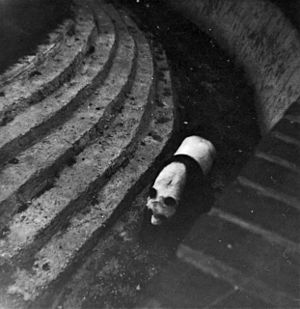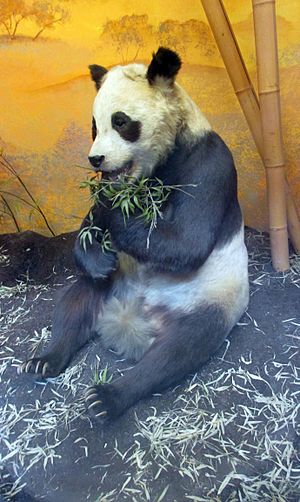Chi Chi (giant panda) facts for kids
Chi Chi (Chinese: 姬姬; pinyin: Jī Jī; born September 1954 in Sichuan, China – died 22 July 1972 at London Zoo) was a very famous female giant panda. She lived at the London Zoo in England. Even though she wasn't the first panda there, Chi Chi quickly became the zoo's biggest star. People all over England loved her. Today, you can see Chi Chi's stuffed body at the Natural History Museum in London.
Contents
Chi Chi's Life Story
Her Early Life and Travels
Chi Chi was caught in May 1955 in Baoxing, Sichuan, China. She was then moved to the Beijing Zoo in June. In May 1957, a leader from Russia, Kliment Voroshilov, asked for a panda for the Moscow Zoo. Chi Chi was sent to Moscow with another panda. However, they had trouble having babies. This was because they had been raised by humans, not other pandas. The Russians even thought both pandas might be male. So, Chi Chi was sent back to China in January 1958.
Later that year, an animal dealer named Heini Demmer got Chi Chi from Beijing Zoo. He traded many African animals for her. Chi Chi then traveled to the Moscow Zoo again for a short rest. After that, she went to Tierpark Berlin, a zoo in East Berlin.
Coming to London
Chi Chi was meant to go to the Brookfield Zoo in the United States. But the US government had a rule against trading with China at that time. This rule even stopped pandas from entering the country. So, Chi Chi could not go to the US.
The Frankfurt Zoological Garden gave Chi Chi a temporary home. Then, Demmer decided to let European zoos borrow her. She visited Copenhagen Zoo before arriving at London Zoo on 5 September 1958. The Zoological Society of London had said they would not collect wild pandas. But they accepted Chi Chi since she was already caught.
Chi Chi's visit was only planned for three weeks. But everyone loved her so much that the zoo decided to buy her. They paid £12,000 for her. Chi Chi officially became London Zoo's panda on 26 September 1958. A photographer named Stanley Long even took special 3D pictures of her.
A Special Diet
Chi Chi loved to eat bamboo. The zoo needed a lot of it! An older gentleman in Cornwall, known as 'The Captain,' heard about this. He lived near a forest with lots of bamboo. He cut some samples and sent them to London. Chi Chi liked it!
The zoo then hired The Captain to send bamboo regularly. He got help from the local Polkerris Scout group. The Scouts would cut the bamboo on Sundays. Their leader, Mike Kerris, would then take it to Par railway station on Monday mornings. From there, it traveled by train to London Zoo. The Polkerris Scouts sent bamboo to Chi Chi until she passed away in 1972. The Polkerris Scout Group even received a special Chi Chi Panda badge for their scarves.
After Chi Chi, in 1974, Prime Minister Edward Heath brought two new pandas from China. Their names were Ching-Ching (female) and Chia-Chia (male). The Scouts started cutting bamboo again for them!
Inspiring a Famous Logo
Chi Chi was a big inspiration for Sir Peter Scott. He was a famous conservationist. He created the simple black and white panda design used as the logo for the World Wildlife Fund (WWF). The current WWF logo is a newer version, designed in 1986.
Her Legacy
Chi Chi died on 22 July 1972. Many people in the country were sad. After she passed away, her body was preserved. Today, you can see her stuffed remains in a glass case at London's Natural History Museum.
 | Ernest Everett Just |
 | Mary Jackson |
 | Emmett Chappelle |
 | Marie Maynard Daly |



